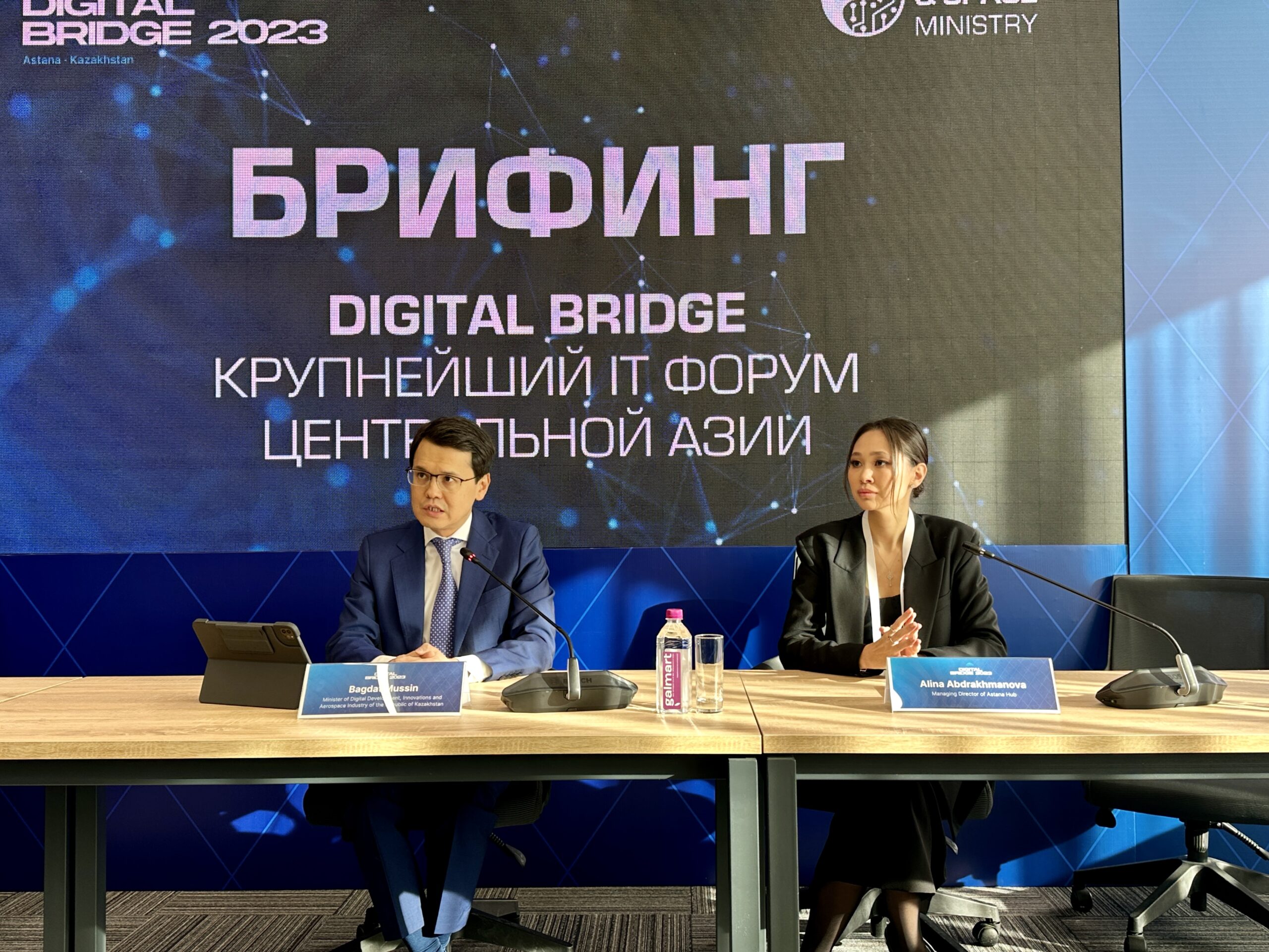ASTANA – Kazakhstan’s partnership with SpaceX to provide 2,000 rural schools with internet is one of the major achievements of Digital Bridge, said Bagdat Mussin, Kazakh Minister of Digital Development, Innovation and Aerospace Industry during the briefing dedicated to preliminary achievements of the conference on Oct. 13 in Astana.

Bagdat Mussin, Kazakh Minister of Digital Development, Innovation and Aerospace Industry and Alina Abdrakhmanova, Managing Director of Astana Hun. Photo credit: The Astana Times.
More than 20,000 participants from at least 30 nations attended the first day of the Digital Bridge forum. It shows how digitization and technology are transforming the way Kazakhstan works, according to the minister.
Over two days of panel discussions, keynote speeches, and exhibitions of start-ups and tech companies, the conference connected innovators with investors to improve the digital and start-up climate.
“We are saying we need to develop into an IT-based state and that is why in the framework of the Digital Bridge forum we invited many venture investors from Türkiye, India, the US, from London. For us, this is a very pleasant occasion. It is not just about Kazakhstan, but also about introducing venture investors to startups throughout Central Asia,” said Mussin.
One of the standout new business engagements was a partnership with SpaceX to bring Starlink connectivity to rural areas, ensuring 2,000 schools are connected to internet.
“There will be a pilot project to provide internet using SpaceX technologies to remote schools in rural areas. Within half a year, we can expect to start providing fast internet to these schools,” said the minister.
With some disparity in access to a stable internet connection between large cities and remote areas in Kazakhstan, investment in telecoms and infrastructure is key to the country’s digital future. The collaboration with SpaceX will be an opportunity for Kazakhs to access good education and get in touch with regional and global business and IT community, said the minister.
“In general, it is not just about education, but it is about providing opportunities to the village residents. There are some villages where now there are 500-600 residents that don’t have access to the internet. If we are able to provide internet to these remote areas, that will be a good advantage in terms of education, they will get access to the services they need and they will have stable access to the internet to develop the IT sector in general,” he said.
At present, Kazakhstan occupies the 28th place in the United Nations (UN) Global E-Government Development Index (EGDI) for the development of electronic government with eighth place in the online services sub-category.
“We are moving to the invisible government concept. ‘Invisible’ does not mean we are hiding as government bodies, but we are moving to proactive services,” said Mussin.
Mussin outlined several e-government services providing consistent digital experiences to citizens. One of them is the provision of birth certificates that could take the stress out of new parents.
“For example, when a newborn comes, the mother and the father receive an SMS from the government the next morning asking them to type the name and surname of the newborn. And if they type the name, they will get the birth certificate in their e-government application within five minutes. After that, the second SMS asks them to choose bank accounts that they want to receive the social payment. And when they choose one of them, the social payment is sent directly to their bank accounts,” Musin said.
Queuing for a kindergarten, selling a vehicle, mortgage deals – all can be done using the online services of e-government.
As a country that embraces rapid digital transformation, Mussin said new development opportunities will be announced soon.
“The next level of our e-government is to integrate AI (Artificial Intelligence) tools because now there are thousands of services on our e-gov mobile platform. We understand that we are able to provide the ChatGPT-style (AI-powered chatbot) service. We are working on that and till the end of the year we will announce it and we will show our people how they can use the ChatGPT style e-gov mobile platform. I think these kinds of initiatives really show the digitalization level of the government,” said Mussin.
The minister also announced that Kazakhstan will host the International Collegiate Programming Contest (ICPC) in 2024. ICPC is an algorithmic programming contest for college students.
“It is something that did not take place in Kazakhstan before,” said Mussin. “So why do we hold events like that? To lead Kazakhs into the IT (Information Technology) profession. (…) For our IT experts and specialists in that sector, it will be an opportunity to become well-known and to demonstrate their successes.”
The minister also spoke about the Silkroad Innovation Hub, which became a networking center in Silicon Valley in the United States for IT specialists from Central Asia and Turkic states.
It offers a set of incentives for regional start-ups to partner with global investors and business incubators, Mussin told journalists.
“This is an opportunity to exchange opinions, to exchange contacts, to find partners to cooperate. And we hope that this will yield very good results. Right now, in the middle of Silicon Valley, we have a place where the IT specialists from Kazakhstan, from Central Asia, from Turkic states can find their home, their digital embassy,” said Mussin.
